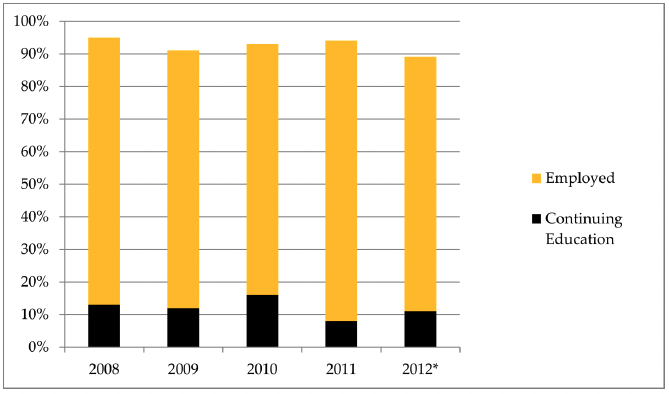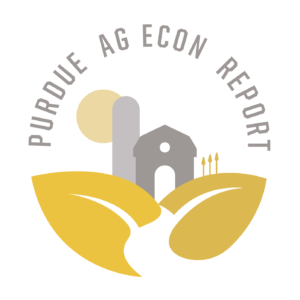Jobs, Jobs, Jobs: Purdue Ag Economics Students Get Them!
June 23, 2012
PAER-2012-04
Andy Oppy, Career Service Coordinator and Academic Counselor
Purdue Agricultural Economics undergraduates continue to have great success in the job market as their degrees open the door to challenging professional opportunities. Just 30 days after graduation, the Class of 2012 reported that 88% had secured full-time employment or elected a professional direction, including further education. This is a common trend for graduates of the department. Over the previous four years, an average of 93% were either gainfully employed or continuing their education within 90 days of graduation (Figure 1).
There are a number of reasons for Ag Econ graduates’ success in finding professional opportunities. The department has been fortunate to attract talented students both as first year students and as older Purdue students who transfer into the program because of the positive things they hear from other Ag Econ students. These students come with both a passion to learn and a passion to lead. These characteristic have been noticed by industry. When asked why he prefers to recruit students from Purdue’s Ag Econ Program, Drew Ratterman, Market Sell Workforce Leader for Dow AgroSciences, said, “It is because of their professionalism and soft skills due to all their extracurricular and experiential activities. As we recruit across many universities, Purdue is second to none.”
Past Agricultural Economics students have had a long history of leadership, which is strongly fostered by the department, and today’s students follow in a wide variety of leadership positions across campus. In most years, Agricultural Economics students hold several officer positions in the College of Agriculture Student Council, are a predominant major among student representatives of the college, and are extremely active in the leadership of residence halls and Greek and Co-Op housing. The department’s students also are active in Purdue Athletics and Purdue Student Union Board and can be found holding high offices within Purdue Student Government.
Another factor leading to career placement success has been the strong growth in the agricultural economy. Throughout the current general economy downturn, agricultural companies have continued to grow and thrive. The growth of ethanol production has increased demands for commodity merchandisers. Advances in technology have provided many more opportunities for our students in the crop protection and seed sector. Also, the aging population of current employees in the industry has created vacancies for recent graduates. And the future looks bright as agriculture is being asked to help meet some of the world’s greatest challenges: feeding 7 billion people (headed to 9 billion), helping increase the world’s energy supply, aiding in global warming solutions, learning to more efficiently use the earth’s limited natural resources, and doing all of this sustainably.

Figure 1. Percentages of Agricultural Economics Graduates Gainfully Employed or Continuing Their Education
Over the years, agricultural companies and organizations have increased the number of internship opportunities available to students. They find internship programs to be a phenomenal way to preview and then to fill their talent pipeline. Students use this form of experiential learning as a way to gain employment experience, learn about the companies, and demonstrate their abilities to potential employers. The department often has more internship request than students to fill those positions. Some internships can even start after a student’s freshman year, which means they may have three summer intern positions in their undergraduate program. A number of seniors return to campus in August with full-time job offers from a summer internship employer.
The Department of Agricultural Economics and the College of Agriculture at Purdue continue to do a terrific job of preparing graduates for the working world. Tim Baker, Recruitment Specialist for Farm Credit of Mid-America said, “I think with the outstanding education that they are receiving along with all of their other activities, they just seem to be better equipped to walk into our company and excel!” The department has a rich history of teaching excellence. Seven faculty members have won Purdue’s highest undergraduate teaching award and five faculty members have been recognized for national excellence in undergraduate teaching by the Agricultural and Applied Economics Association since 2000.
Students get exposed to employers by design. In October each year, the college hosts an Agricultural Career Fair with over 120 employers in attendance. Many return to campus for the Spring Fair in February. Bringing these representatives to campus offers outstanding opportunities for students to explore career opportunities. Beyond the Career Fair, the college and the department send notices to students regarding job opportunities on a daily basis. The Agribusiness Club and Farm Management Club sponsored by the department hosted 10 different companies at their meetings this past year to provide information and networking opportunities for students. One of the clubs hosted a “Benefits Seminar” aimed at helping graduates better understand the full benefits packages that generally come with an official professional job offer. Professors often use guest lecturers to help students understand the relevance of economic principles to the “real” world. In turn, the organizations those guests represent are often back on campus seeking to employ talented students.
It is easy to see why students earning a degree from the Department of Agricultural Economics at Purdue University have been so successful in their career searches. Carefully balancing education, extracurricular leadership, and experiential learning and having outstanding teachers in an environment that fosters strong become sought-after employees with opportunities for professional Jobs, Jobs, Jobs.
